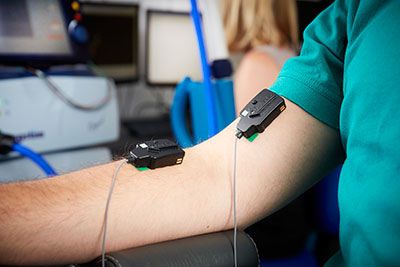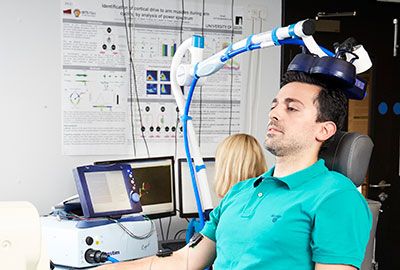Sport and Exercise Sciences Facilities
Neuromuscular Function Laboratories
Neuromuscular Function Laboratories
We use a variety of experimental techniques that provide fundamental insight into several aspects of muscle physiology, neurophysiology, and cognitive neuroscience.
For example, we interrogate the force or pressure and EMG/compound muscle action potential responses to stimulation of peripheral nerve roots (eg the femoral, median or phrenic nerve).
This allows us to assess alterations in neuromuscular function, providing mechanistic insight into the development of skeletal muscle fatigue in response to physiological and/or environmental challenges (eg exercise, hypoxia) and in special populations (eg heart failure).
We are also able to gain mechanistic insight into the control of voluntary movement and how this changes with learning and in individuals with spinal cord injury using nerve stimulation techniques.
In addition, we apply magnetic stimuli to the motor cortex (transcranial magnetic stimulation, TMS) to assess central neuromuscular function, including measures of neural development, decay and excitation/inhibition, in vivo in humans.
Through the delivery of magnetic stimuli to discrete collections of neurons in the motor cortex and measurement of the associated evoked potential we gain insight into the corticospinal excitability of specific target muscle groups, and can assess the efficacy of targeted rehab paradigms.
Key Equipment; Magstim Rapid2; Magstim BiStim2; Digitimer DS7A Current Stimulator; Digitimer D360 8-Channel Patient Amplifier; Delsys Trigno wireless EMG system with Avanti Sensors; Cambridge Electronic Design Micro 1401 Data Acquisition System integrated with Spike 2 software.
Contacts: Dr Bryan Taylor (b.j.taylor@leeds.ac.uk); Dr Sarah Astill (s.l.astill@leeds.ac.uk).



